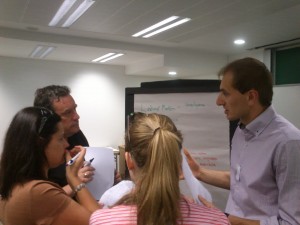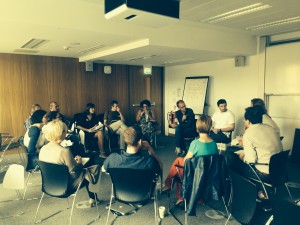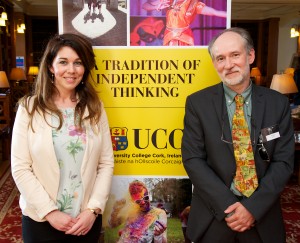Challenges and Opportunities of the Ageing Technology: Exploring the use of Technology Assessment
From the 17th until the 20th of June 2012 the PACITA consortium (particularly University College Cork, SPIRAL Research Centre at the University of Liège, Rathenau Institute, Danish Board of Technology and the Norwegian Board of Technology) organised the second European Summer School on Technology Assessment entitled: “Challenges and Opportunities of the Ageing Technology: Exploring the use of Technology Assessment”.
Venue
The summer school was held on the campus of University College Cork. Originally founded in 1845 as “Queen’s College Cork”, UCC is one of Ireland’s oldest institutions of higher education. Over 150 years later, the University is internationally acclaimed as one of the top 2% of research institutions in the world. UCC has achieved the unique status of becoming Ireland’s first five star university and has a significant position in world rankings in the QS World University Rankings.
Participants
 54 applications were received for the summer school, whereby 35 participants were selected on the basis of their motivation letters and according to a balanced mix of professional backgrounds and countries (including outreaches towards South American, and African countries). Some could not attend due to personal reasons therefore 26 participants arrived in Cork on the 17th June to contribute to the event. While the number was reduced, it was determined the mix of participants enabled relevant discussions as there was significant variety in the participant experience and backgrounds to encourage a collegial learning environment. In order to get prepared for the summer school, a Dropbox account containing a literature portfolio about TA, TA methods and communication strategy, and the ageing society was shared with participants prior to the event. The Summer School brought together various stakeholder groups from policymaking, policy advising, academia, industry, and civil society organisations.
54 applications were received for the summer school, whereby 35 participants were selected on the basis of their motivation letters and according to a balanced mix of professional backgrounds and countries (including outreaches towards South American, and African countries). Some could not attend due to personal reasons therefore 26 participants arrived in Cork on the 17th June to contribute to the event. While the number was reduced, it was determined the mix of participants enabled relevant discussions as there was significant variety in the participant experience and backgrounds to encourage a collegial learning environment. In order to get prepared for the summer school, a Dropbox account containing a literature portfolio about TA, TA methods and communication strategy, and the ageing society was shared with participants prior to the event. The Summer School brought together various stakeholder groups from policymaking, policy advising, academia, industry, and civil society organisations.
Topic
How to cope with ageing societies is one of the grand challenges pointed out in the Lund Declaration. The rapidly growing population of elders confronts Europe with a double demographic challenge. The ageing population’s need for healthcare services increases at the same time as the access to workforce declines. Given the services as they are today, the needs for care in the population will at some point surpass the available workforce. Healthcare technologies can be increasingly important for society to be able to offer health and care services at a quantity and quality that mirrors the expectations of the European population. So, how can we best use new technology in care services, and what type of policy options are policy makers faced with? This challenge refers to the interplay of actors, technologies, policies, worldviews and institutions engaged in the field of ageing debates, policies and production.
Objective
In order to capture the complexity of what is at stake, TA’s rationale, methods and techniques offer powerful tools that are essential for both analysts and solution-oriented professionals. The Summer School provided the participants with comprehensive insights into knowledge production on opportunities and consequences of technologies, by relying on the great diversity of TA practices utilised across Europe. This enabled the participants to combine a forward-looking perspective on new scientific and technological developments with the ambition to influence their embedding in society. Participants of the Summer School were offered the opportunity to sharpen their analytical skills and they were encouraged to simultaneously consider socio-cultural, economic, ecological, technological, infrastructural and institutional factors in order to determine barriers and opportunities for future social and technological evolutions. Throughout a stimulating learning process, TA rationales, methods and techniques were mobilised to address questions such as:
- What are the challenges for adoption of technology to address the grand challenge of the Ageing Society?
- How can issues raised by technology and Ageing Society be brought more convincingly into the public awareness?
- What role can public participation play, knowing that divergent voices are heard from civil society, academia, care providers, politicians, and pharmaceutical and hi-tech companies about the future of health care systems in Europe?
Programme & Lectures
Wednesday 18th June 2014:
- Dr Ciara Fitzgerald : Introduction to Summer School Format
- Dr Jon Fixdal (NBT): Introduction to TA and the theme of the summer school
- Marie Louise Jorgensen (DBT): Problem Definition and TA Research Design
Thursday 19th June 2014:
- Marie Louise Jorgensen (DBT): The Methods Toolbox for Technology Assessment
- Dr Marlies Hanifer and Dr André Krom (Rathenau Institute): Communication and the strive for Impact
Friday 20th June 2014:
- Benedikt Rosskamp(Ulg): Concluding Remarks from a Non-TA Country: Insight and future directions
Workshops
 After intense discussion rounds following the lectures, the participants were split up in two working groups. They received different assignments and methods in order to stimulate and debate about a scenario TA project. Jon Fixdal (NBT) supervised the first group whilst Andre Krom (Rathenau Institute) was facilitated the second group. The other lecturers were available for questions, acted as the board for the group presentations and attended all presentations. The participants were encouraged to rely on their own disciplinary expertise (such as ethics, law, political and social sciences, STS, natural or applied sciences) and/or experience (as policy-makers, civil society organizations, media, etc.). There were in total six workshop sessions according the different phases of a TA project as previously described the lecturers: problem definition and research design; methodological aspects; communication and dissemination; and a finalisation workshop before the two groups presented their work to the plenary. In these workshops, the participants were confronted with questions such as demand analysis, project management and division of work, exploration of the stakeholders and technologies at stake. Furthermore, they were challenged to make methodological choices, and quickly respond to outside demands and pressures in addition to planned working and communication strategies.
After intense discussion rounds following the lectures, the participants were split up in two working groups. They received different assignments and methods in order to stimulate and debate about a scenario TA project. Jon Fixdal (NBT) supervised the first group whilst Andre Krom (Rathenau Institute) was facilitated the second group. The other lecturers were available for questions, acted as the board for the group presentations and attended all presentations. The participants were encouraged to rely on their own disciplinary expertise (such as ethics, law, political and social sciences, STS, natural or applied sciences) and/or experience (as policy-makers, civil society organizations, media, etc.). There were in total six workshop sessions according the different phases of a TA project as previously described the lecturers: problem definition and research design; methodological aspects; communication and dissemination; and a finalisation workshop before the two groups presented their work to the plenary. In these workshops, the participants were confronted with questions such as demand analysis, project management and division of work, exploration of the stakeholders and technologies at stake. Furthermore, they were challenged to make methodological choices, and quickly respond to outside demands and pressures in addition to planned working and communication strategies.
Testimonials from participants
“I want to thank you for the excellent Summer School that I have attended. These 3 days of great information were very well organised and essentially highly practical. The invited experts have a great level of knowledge and experience in ‘Technology Assessment’ that helped us structure good projects within the working groups aligned with the objectives of the Summer School. I really enjoyed this opportunity, learned a lot and will try disseminate what I have acquired in my institution”.
“I would like to thank you and the PACITA team for this interesting summer school, where I learned more about TA projects, their methods and the importance of the communication strategy to strive for impact. I think the workshops/simulations were a very motivating way of sharing knowledge and experiences, because we were obliged to think and discuss about everything to reach a consensus, which was not always an easy task. All the lectures were very useful to frame the activities and the steps were systematically questioned by André Krom (group B facilitator) in order to stimulate the debate. In addition, all participants were actively engaged and were established important contact networks”.
“After attending the first PACITA Summer School in 2012, my personal standards for the second one, were really high! And for the second time, I was surprised by the high level of quality and organization that was offered to the participants. High quality lectures followed by stimulating workshops made the day! In the workshops, practical training, real up-to-date situations exercises, group reflections and knowledge exchange proven to be the major advantage for participating in the event. Social networking was not taken with less consideration… The organization offered the opportunity to have delicious meals as a mote for relationship development among the participants.”
“I come from the perspective of privacy impact assessments, or PIA in short, and recently the research on PIA leaves more and more open questions. Among others, PIA has its own limits in protecting privacy, which nowadays is challenged by emerging technologies. Thus I am interested in a broader picture of impact assessments and this includes technology assessment. The PACITA European Summer School on Technology Assessment, by the interaction of high-profile tutors with young professionals, offered a concise yet solid introduction to the notion of parliamentary technology assessment, thus satisfying a number of my academic curiosities.”
“I want to thank you for the excellent Summer School that I have attended. These 3 days of great information were very well organised and essentially highly practical. The invited experts have a great level of knowledge and experience in ‘Technology Assessment’ that helped us structure good projects within the working groups aligned with the objectives of the Summer School. I really enjoyed this opportunity, learned a lot and will try disseminate what I have acquired in my institution. I reckon that this Summer School was useful for networking and for establishing new relations with other participants with whom I can collaborate in the near future within H2020 (The new EU Programme for Research & Innovation ‘2014-2020’) in order to submit some proposals.”
“For me PACITA Summer School was a very practical and intense experience. As a result I have clearly understood why TA needs that many and multifarious methods to be used.”
“The PACITA summer school was a great inspiration for me. Many scholars claim that technology is always the answer and the solution. While working in a team I discovered so many new questions about the role of technology in hyperconnected societies”.
“Coming from a country that does not have experience with/ tradition of technology assessment, I highly value the opportunity to meet and get acquainted with researchers and TA practitioners from other countries that are working in the field. There is only a small pool of professionals that are actively working at the intersection of science, technology and society. (In Latvia I can literally count them on the fingers). PACITA summer school has been an excellent occasion to connect with like-minded people from a wide range of backgrounds. It has definitely helped to feel less solitary pursuing my research interests. I consider that there has been a good balance between the wealth of compiled background information, practical TA tips and tricks that have been well presented by the lecturers and interactive group work. I am convinced this experience will have a very practical value for me in the future in formulating research proposals, weighting pros and cons of specific methodologies and engaging in communication and policy impact efforts.”
“It was first this kind of summer school for me but I must admit that it was very great experience. The time was very productive and I learned a lot of interesting things about TA in aging society. For sure it will bring benefit in my future work and proposal writing. I have already some good ideas! But apart of very well done prepare lectures and work project I really appreciate the PACITA team. They were very professional, open minded and ready to answer to all of our questions and doubts. Thank you once again!”
“I just wanted to thank you and the rest of the PACITA team once more for a very productive and worthwhile summer school. I am sure that what I learned will be of benefit in my future work and proposal writing, and I hope to work with many of the participants in the future, should the future allow it! PACITA is clearly a very impressive project, particularly in its scope, and I look forward to hearing of its successful outcomes in the near future.”
“After having read much about TA, the Summer School was an excellent opportunity to meet real practitioners and engage in the dynamics of preparing a TA project. It also encouraged me to think about the possibilities of implementing TA methodologies in my home country.”
“The summer school provided me with valuable insight into the TA area and combined with hand-on workshops and shared experience with other participants with many backgrounds, it created valuable experience with great potential into the future.”




